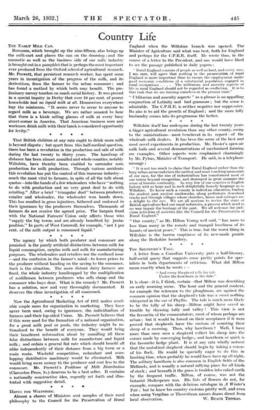Wiltshire itself has undergone during the last twenty years a
bigger agricultural revolution than any other county, owing to the ministrations—mist beneficent in its regard—of the wholesale milk dealers. It has been the scene of the best and most novel experiments in production. Mr. lIosicr's open-air milk bails and several demonstrations of mechanized farming are examples. Other aspects were emphasized charmingly by Mr. Pybus, Minister of Transport. Ile said, in a telephone message : " It is not too much to claim that Rural England rather than the busy urban areas enshrines the earliest and most touching memorials of our race, for rho rise of industrialism has transforms' most of our towns beyond recognition, and destroyed in great measure the sense of historic continuity. In very few of our counties is English history writ so large and m such delightfully homely language as in Wiltshire. To know such a county is indeed an education. leading
the student past ancient earthworks, along prehistoric downland tracks and through villages whose churches, farms and cottages are a delight to the eye. We are all anxious to revive the state of British agriculture tend our rural industries, a process which need in no way impair the heritage of the past. We all welcome the judi- cious activities of societies like the Council for the Preservation of Rural England."
" Our county," as Mr. Hilton Young well said, " has more to lose than many in the remote and tranquil loveliness of its haunts of ancient peace." This is true, but the worst thing in Wiltshire is the barren emptiness of its new-made prairie along the Berkshire boundary.


































 Previous page
Previous page